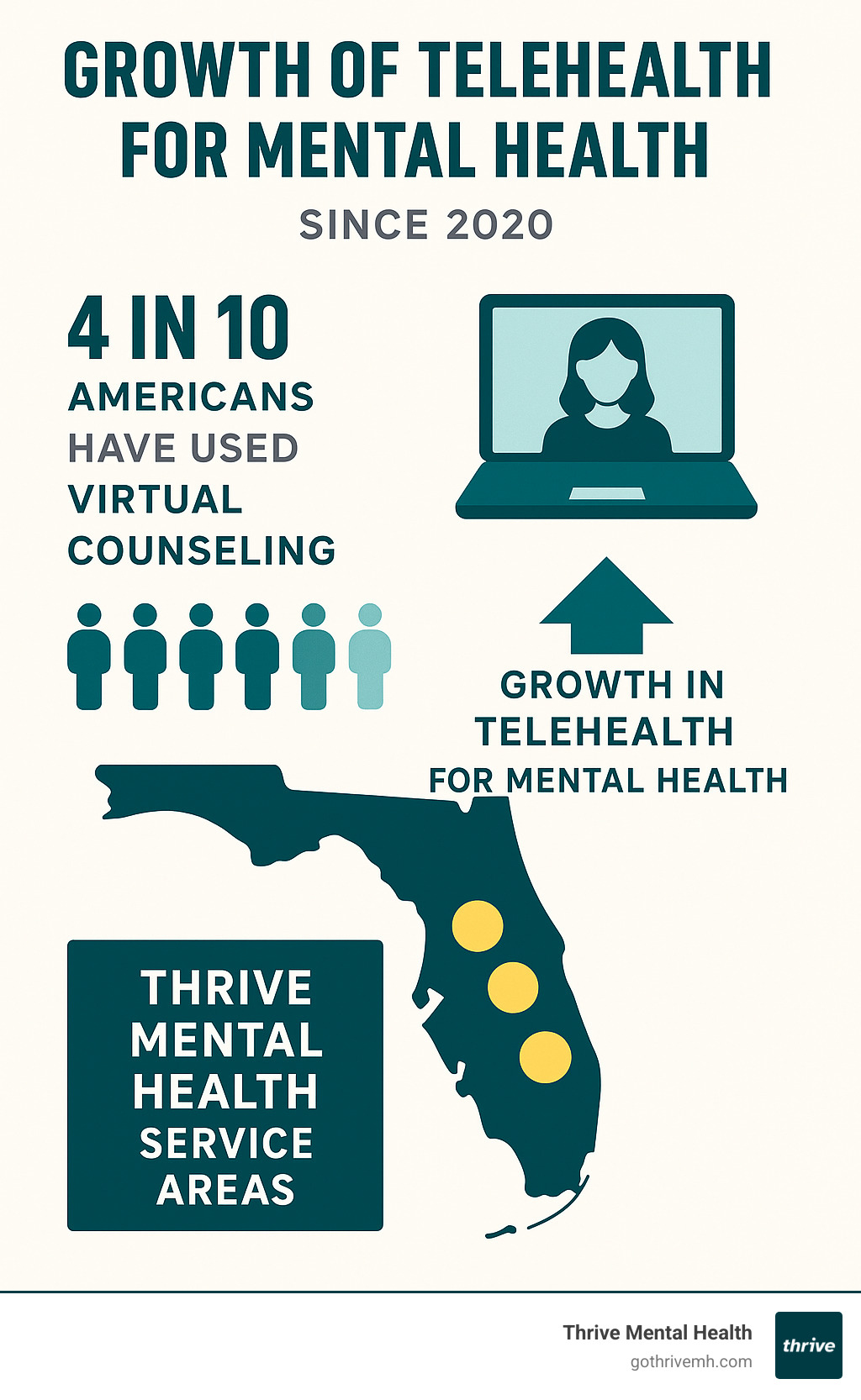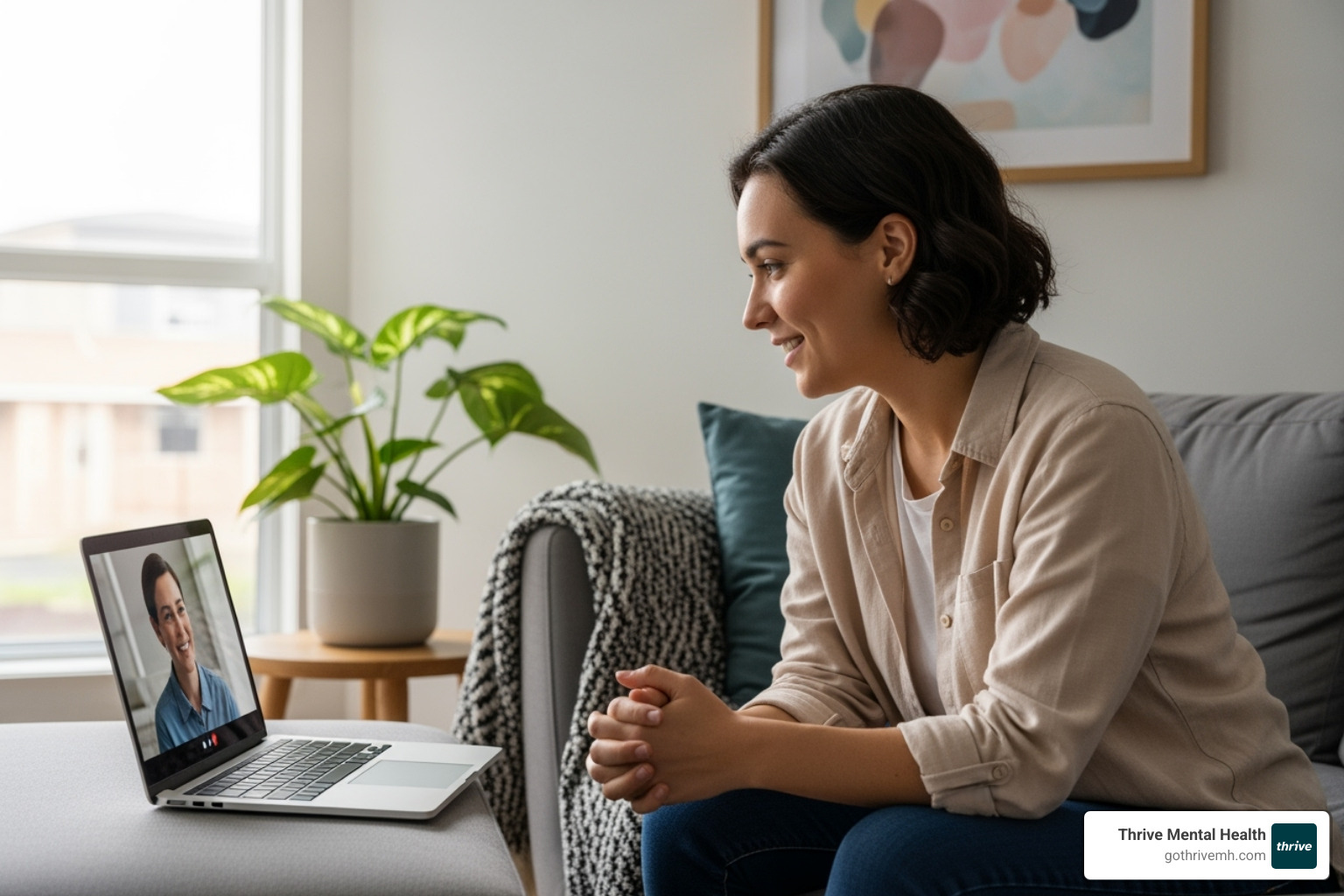Remote Control: Finding the Best Virtual Mental Health Counseling

Why Virtual Mental Health Counseling is Revolutionizing Access to Care
Virtual mental health counseling has transformed how millions of Floridians access therapy and psychiatric care. This comprehensive guide will help you understand your options and find the right online mental health support for your needs.
Key Virtual Mental Health Counseling Options:
- Individual Therapy – One-on-one sessions via video, phone, or messaging
- Specialized Programs – Virtual Intensive Outpatient Programs (IOP) and Partial Hospitalization Programs (PHP)
- Psychiatric Services – Medication management and evaluation
- Crisis Support – 24/7 helplines and emergency resources
- Group Therapy – Virtual support groups and skill-building sessions
The shift to virtual care has been remarkable. Since 2020, online counseling has become a vital resource for Floridians, mirroring a national trend where four out of ten Americans have used telehealth for mental health. This move was driven by the need for accessible, flexible support. Research consistently shows that online therapy delivers comparable results to in-person treatment, with 70% of users seeing improvement in anxiety or depression symptoms within three months.
For busy professionals dealing with anxiety, depression, or life transitions, virtual counseling eliminates traditional barriers like commute time, scheduling conflicts, and geographic limitations. Whether you’re in Tampa Bay, Central Florida, or anywhere across the state, quality mental health care is now available from your home or office.
I’m Nate Raine, CEO of Thrive Mental Health, where I’ve championed innovative approaches to behavioral health including comprehensive virtual mental health counseling programs. My experience leading both healthcare technology initiatives and mental wellness companies has shown me how virtual care can dramatically improve access to life-changing treatment.

Relevant articles related to virtual mental health counseling:
The Best Benefits of Virtual Mental Health Counseling
There’s something special about receiving support in a space where you feel completely at ease. Virtual mental health counseling brings that comfort right to your living room, kitchen table, or wherever you feel most relaxed. At Thrive Mental Health, we’ve watched countless clients find just how transformative this approach can be.
The effectiveness of virtual therapy might surprise you. Research shows that 70% of people see real improvement in their anxiety or depression symptoms within just three months of starting online therapy. Our own clients at Thrive consistently experience a 25% clinical improvement in just three sessions. This isn’t just feel-good numbers – it’s backed by solid scientific research on online CBT effectiveness that proves virtual care delivers results.
For many Floridians living in rural areas, virtual mental health counseling is a game-changer. No more two-hour drives to Tampa or Miami for quality care. Whether you’re in the Panhandle or the Keys, expert therapists are just a video call away. This accessibility also helps reduce the stigma that sometimes comes with walking into a therapist’s office – you’re in control of your environment and your privacy.
Let’s talk about real life for a moment. Between work deadlines, family obligations, and Florida traffic, finding time for traditional therapy can feel impossible. Virtual sessions fit around your schedule, not the other way around. Need a session during lunch break? Done. Prefer evening appointments after the kids are asleep? We’ve got you covered.
The cost factor is worth mentioning too. Without the overhead of maintaining physical office spaces, many virtual programs can offer more affordable options. At Thrive, we work hard to make our services accessible to everyone who needs them. You can learn more about how our approach works at Thrive Mental Health’s online therapy page.
Conditions Addressed Through Virtual Therapy
Virtual mental health counseling at Thrive Mental Health addresses the full spectrum of mental health challenges that people face every day. Our expert-led, evidence-based programs are designed for real people dealing with real struggles.
Anxiety is one of our most common areas of focus – whether you’re dealing with generalized worry, social anxiety, or panic attacks that seem to come out of nowhere. Depression in all its forms, from seasonal blues to postpartum challenges, responds well to virtual treatment. We also help with stress management when work pressure or life transitions feel overwhelming.
Relationship issues and family conflicts don’t pause for convenient appointment times, which is why virtual support works so well. We provide compassionate care for grief and loss, helping you process difficult emotions at your own pace. For those dealing with trauma or PTSD, the safety of your own space can actually improve the therapeutic process.
Our therapists are skilled in supporting OCD, providing parenting guidance when you’re struggling with raising kids, and addressing eating disorders with sensitivity and expertise. We also offer specialized support for substance use challenges, mood disorders like bipolar disorder, and concerns around self-esteem and body image.
For LGBTQIA+ individuals seeking affirming care, virtual therapy can provide a safe space to explore identity and relationships. We also understand the unique pressures facing those dealing with chronic illness and how it impacts mental health.
If anxiety is your primary concern, our remote therapy for anxiety at Thrive offers targeted approaches to help you regain control and find peace in your daily life.
Is It as Effective as In-Person Therapy?
Here’s the question everyone wants answered: does virtual mental health counseling really work as well as sitting across from a therapist in person? The research is crystal clear – and the answer is absolutely yes.
Studies consistently show that 80% of people find virtual therapy as effective or more effective than traditional face-to-face sessions. Even more impressive? 98% of users report it’s more convenient. At Thrive, we see these statistics play out in real life with our clients achieving that 25% clinical improvement in just three sessions.
There’s something powerful about being in your own environment during therapy. Many clients tell us they feel more open and honest when they’re sitting in their favorite chair or at their kitchen table. That comfort translates into deeper conversations and more meaningful progress.
Even text-based communication has shown positive results in clinical studies. The key is finding the communication style that works best for you. Some people are more expressive in writing, while others prefer video calls where they can see their therapist’s expressions.
A comprehensive study published in the Journal of Consulting and Clinical Psychology found that online therapy is as effective as in-person therapy for treating various mental health conditions. The therapeutic relationship – that crucial bond between you and your therapist – develops just as strongly through a screen as it does in person.
For more insights into how virtual care is changing mental health treatment, explore our comprehensive guide on telehealth for mental health at Thrive. The future of mental health care is here, and it’s more accessible than ever before.
Your Roadmap to Finding a Qualified Virtual Counselor

Finding the right therapist for virtual mental health counseling can feel like looking for a needle in a haystack. But here’s the good news: with the right approach, you can find someone who truly gets you and can help you thrive.
The most important thing to check first is licensing. Your therapist must hold a valid license in the state where you live. This isn’t just paperwork – it’s your guarantee that they’ve met rigorous educational standards and follow strict ethical guidelines. Think of it as your safety net.
State boards oversee these licenses, so they’re your go-to resource for verification. Professional directories are also excellent starting points, especially those with thorough vetting processes. Some platforms are so selective that they only accept about 25% of therapist applicants after extensive background checks and interviews.
Don’t overlook resources you might already have access to. Many Employee Assistance Programs (EAPs) through your workplace offer mental health services, including virtual options. If you’re a student, university health services often provide therapy that can be accessed remotely.
At Thrive Mental Health, we’ve done the heavy lifting for you. Our team consists of carefully vetted, licensed professionals who specialize in evidence-based care. You can learn more about our dedicated team and comprehensive services on our About Us page.
Finding a Licensed Therapist in Florida
If you’re in Florida, you’re in luck – verifying credentials is straightforward. The Florida Board of Mental Health Counseling maintains records of all licensed professionals in our state. This is your first stop when checking if a therapist is legitimate and qualified to provide care to Florida residents.
State-specific licenses matter more than you might think. A therapist licensed in California can’t legally provide services to someone living in Miami. It’s not just about following rules – it ensures your therapist understands Florida’s specific regulations and can provide you with proper care.
Verifying credentials might sound tedious, but it’s worth the peace of mind. When you choose Thrive Mental Health, this step is already handled. All our therapists are properly licensed to practice in Florida, so you can focus on what matters most – your healing journey. You can Find Online Therapy in Florida with Thrive and explore our specialized Virtual IOP in South Florida programs.
Specialized Resources for Specific Groups
Not everyone’s mental health journey looks the same, and that’s exactly why specialized care matters. At Thrive Mental Health, we recognize that different groups face unique challenges and deserve custom support.
Students and young people often juggle academic pressure, social anxiety, and major life transitions all at once. Our programs understand these specific stressors and provide age-appropriate strategies. Whether you’re dealing with exam stress or figuring out your career path, we offer dedicated support for university and college students at Thrive.
First responders face trauma and stress that most of us can’t imagine. They need therapists who understand the weight of their daily experiences. Our specialized mental health resources for first responders at Thrive provide the understanding and tools these heroes deserve.
LGBTQIA+ individuals often need affirming care that celebrates their identity rather than questioning it. Our therapists are trained to provide inclusive, supportive environments where you can be completely yourself.
The beauty of virtual mental health counseling is that it connects you with specialists who truly understand your experience, regardless of where you’re located in Florida. You don’t have to settle for whoever happens to be nearby – you can find someone who really gets what you’re going through.
What to Expect: Your First Session and Beyond

Starting virtual mental health counseling can feel like stepping into uncharted territory, but at Thrive Mental Health, we’ve designed the process to be as welcoming and straightforward as possible for our clients across Florida. Think of your first session as a conversation with someone who genuinely wants to understand your story and help you write the next chapter.
The journey begins with our matching process, which is like having a thoughtful friend introduce you to the perfect therapist. We take time to understand not just your clinical needs, but also your personality, preferences, and what makes you feel comfortable. Are you someone who appreciates direct feedback, or do you prefer a gentler approach? Do you thrive with structure, or do you need flexibility? These details matter, and they help us pair you with a Florida-licensed therapist who truly gets you.
Before your first session, you’ll complete intake forms that give your therapist important background information. This isn’t paperwork for paperwork’s sake – it’s your chance to share your story in your own words, at your own pace. Your therapist will review this information beforehand, so when you meet, they’ll already have a foundation to build on.
Your initial consultation is where the real connection begins. This isn’t about diving straight into the deep end of your challenges. Instead, it’s about getting to know each other, discussing what brought you to therapy, and beginning to set clear, achievable goals for your journey together. We believe in collaborative care, which means your voice is central to shaping your treatment plan.
One of the most powerful aspects of virtual mental health counseling is the flexibility in how you connect with your therapist. At Thrive, we offer multiple communication methods, each with its own strengths:
Video calls provide the closest experience to in-person therapy, allowing you and your therapist to pick up on facial expressions, body language, and other non-verbal cues that enrich the therapeutic conversation. Phone calls offer convenience and accessibility, perfect for busy schedules or when you need to connect from different locations. Live chat provides real-time support with the comfort of written communication, while asynchronous messaging lets you share thoughts and reflections between sessions when inspiration strikes or challenges arise.
This variety means you can choose the method that feels most natural for each session, or even switch between them as your needs evolve. For more information about how our comprehensive approach works, explore our virtual program approach.
How to Prepare for Your First Virtual Therapy Session
Preparing for your first virtual mental health counseling session is about creating the right environment – both physically and mentally – for meaningful conversation and growth.
Finding your private space is crucial. This might be your bedroom, a quiet corner of your living room, or even your car if that’s the most private spot available. The key is choosing somewhere you feel safe to be vulnerable and won’t be interrupted. Let household members know you’ll be in session, and consider putting a sign on your door if needed.
Testing your technology beforehand saves you stress on session day. Make sure your internet connection is stable, your camera and microphone work properly, and you know how to use the platform. Do a test call with a friend if you’re feeling uncertain. Having backup options – like your phone’s hotspot or a different device – can be helpful too.
Setting intentions for your session helps you make the most of your time together. What do you hope to accomplish? What’s been weighing on your mind? You don’t need to have everything figured out, but having some sense of what you want to focus on can guide the conversation.
Preparing questions is also valuable. What do you want to know about your therapist’s approach? How will you work together? What can you expect from the process? This is your time, and good therapists welcome questions.
Journaling beforehand can help you organize your thoughts and feelings. Even just a few minutes of writing about what’s been going on in your life can help you articulate your experiences more clearly during the session.
Understanding the Limitations of Virtual Counseling
While virtual mental health counseling offers incredible benefits, it’s important to understand when it might not be the right fit. Being honest about these limitations helps ensure you get the care that’s most appropriate for your situation.
Crisis situations require immediate, in-person intervention that virtual therapy simply cannot provide. If you’re having thoughts of harming yourself or others, don’t wait for your next therapy session. Instead, reach out to the 988 Suicide Crisis Helpline for immediate support, or go to your nearest emergency room.
Technology issues can occasionally disrupt sessions. Poor internet connections, software glitches, or device problems can interrupt the flow of conversation. While these issues are usually minor and temporary, they can be frustrating when you’re in the middle of sharing something important.
Non-verbal cues can be harder to read through a screen. While video calls capture much of your body language and facial expressions, they don’t provide the complete picture that in-person therapy offers. Some therapists and clients find this limitation affects the depth of connection, though many others adapt well to virtual communication.
Severe mental illness requiring intensive in-person care may not be well-suited to virtual therapy alone. Conditions that require frequent monitoring, complex medication management, or crisis intervention may benefit more from traditional in-person treatment or a combination of both approaches.
Finally, having a reliable internet connection is essential for effective virtual therapy. If your internet frequently cuts out or is too slow for video calls, the therapeutic process can become frustrating rather than helpful.
Despite these limitations, most people find that virtual mental health counseling provides excellent care and meaningful results. The key is working with your therapist to determine if virtual sessions meet your specific needs and adjusting your approach if necessary.